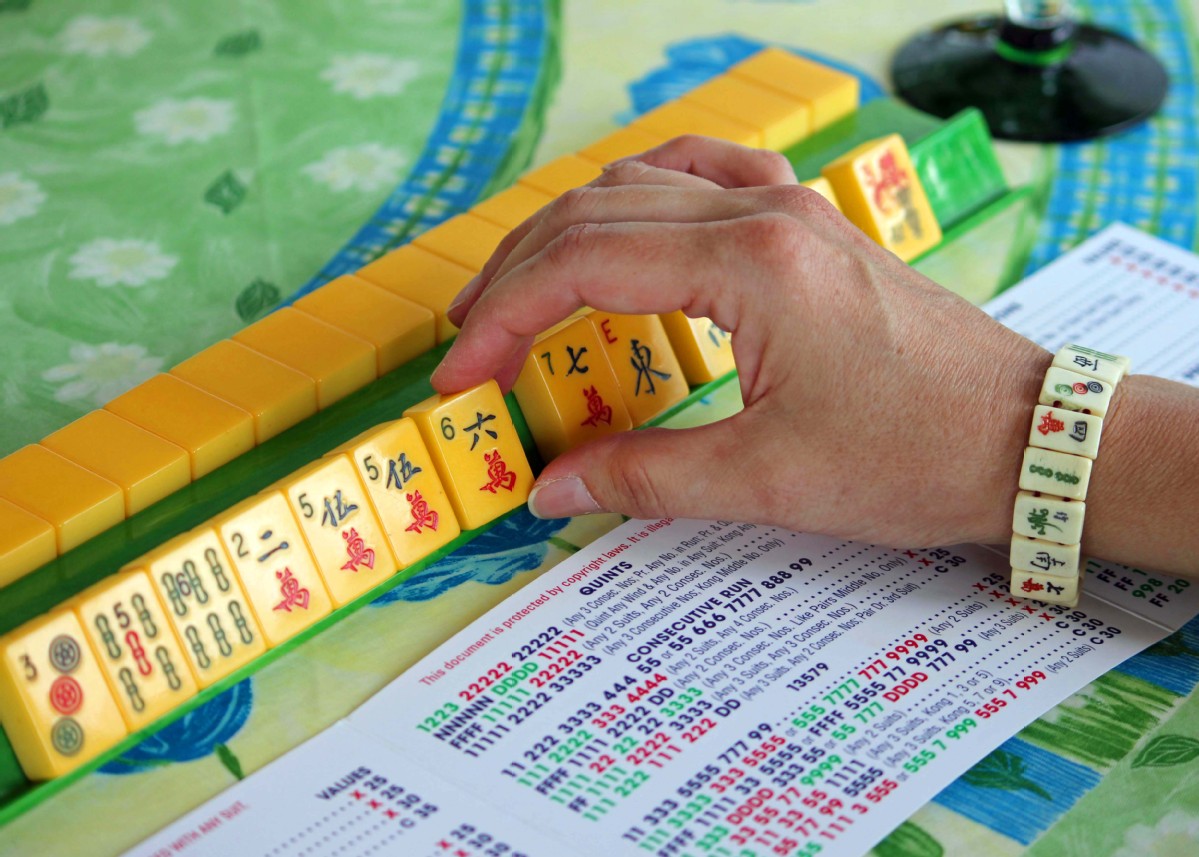Young players put mahjong skills to test


Hobby no longer sole preserve of seniors
Joanna Sim, 19, who will start university in August, had always been interested in learning how to play mahjong.
However, it was only last year that she became proficient at the game, with the help of her sister, Rachelle, 20.
Staying at home in Singapore during the coronavirus outbreak last year, the sisters and their parents turned a weekly game of mahjong into a family-bonding activity. They even created a scoreboard to keep track of the winning tallies.
"As my family members had to spend a lot of time together, we needed to find an activity that would involve all of us," Joanna Sim said. "In addition, given that my sister and I are both older now, a typical family board game would not suit us."
Often considered to be a game for seniors, mahjong has found new popularity among young people, especially during the COVID-19 pandemic.
A number of online mahjong groups catering to the young have emerged in recent years.
In Singapore, there are at least 12 groups for mahjong players. Some have nearly 10,000 members and serve as forums for people to ask questions about the rules of the game, share tile combinations or find new mahjong kakis, or "friends" in colloquial Malay.
For the past two years, Singapore Polytechnic student Lim Chuan Xun, 18, has seen more young people uploading photos of mahjong sessions on social media platforms such as Instagram.
"You're naturally interested in what your friends are doing and want to give it a try," he said.
Chuan Xun, who learned to play mahjong from his father at age 15, said he rushes through his assignments on weekdays so he can devote weekends to the game.
He has played mahjong every week during the pandemic, as more of his peers have learned the game.
Singapore retailers said that for the past year or so, they have sold more mahjong sets to players in their 20s and 30s.
Mahjong retailer Tong Cheong Soon Kee Trading has seen a 30 per cent rise in young customers since November.
Co-owner Jay Leow, 35, said these customers usually opt for mahjong tiles in bold and striking colors such as pink or gold.
"With the COVID-19 situation, many young people who like to travel are stuck in Singapore, so mahjong has become one of their new hobbies," he said.
Some 80 percent of the customers at Tong &Da, which sells automatic mahjong tables, are in their 20s and 30s.
They buy starter mahjong sets mainly from the retailer's e-commerce stores, and it has reported a 20 per cent rise in sales since the pandemic emerged.
Undergraduate Brennan Lee, 21, has been playing mahjong more frequently-at least once a week-during the pandemic.
When the number of visitors to a household in Singapore was capped at five, he found the game, which requires four players, a good way to hang out with friends.
"I get to play mahjong and spend time with different groups of pals. It's a win-win situation," he said.
Singapore Polytechnic graduate Vicki Wong, 20, missed mahjong so much during the "circuit breaker" introduced in the city-state during the pandemic last year that she played the game almost every other day as soon as the second phase of the city's reopening started.
She is intrigued by the game, as it gives her a glimpse of each player's character, such as whether he or she is a good sport or a bad loser.
"I feel a great sense of accomplishment after racking my brains to form a winning hand that is rare or difficult to achieve," she said.
The game has also helped her to solidify friendships, such as that with fellow Singapore Polytechnic graduate Clarence Quek, 22, whom she met three years ago when both were novice players.
Quek said: "I would say she is around for at least nine out of 10 games I play. That's why we ended up being best friends."
Young people are also buying customized mahjong sets as housewarming or birthday gifts. Tiles include surnames or a cartoon design of the family dog printed on the back.
Agnes Ong, 33, founder of CustoMy Mahjong, which sells custom-made sets online, said more people in their late 20s to 30s have bought these gifts since 2019.
Three years ago, civil servant Alex Cheng, 30, customized a fruit-themed mahjong set for his brother and sister-in-law. Pineapples, a symbol of prosperity, adorn the back of the tiles to bestow extra luck. The tiles come with images that include oranges and apples-perfect for his brother, who loves fruit.
As more young people become interested in playing mahjong, John Shepherd Lim, chief well-being officer at the Singapore Counselling Centre, warned them to avoid becoming addicted to the game.

































